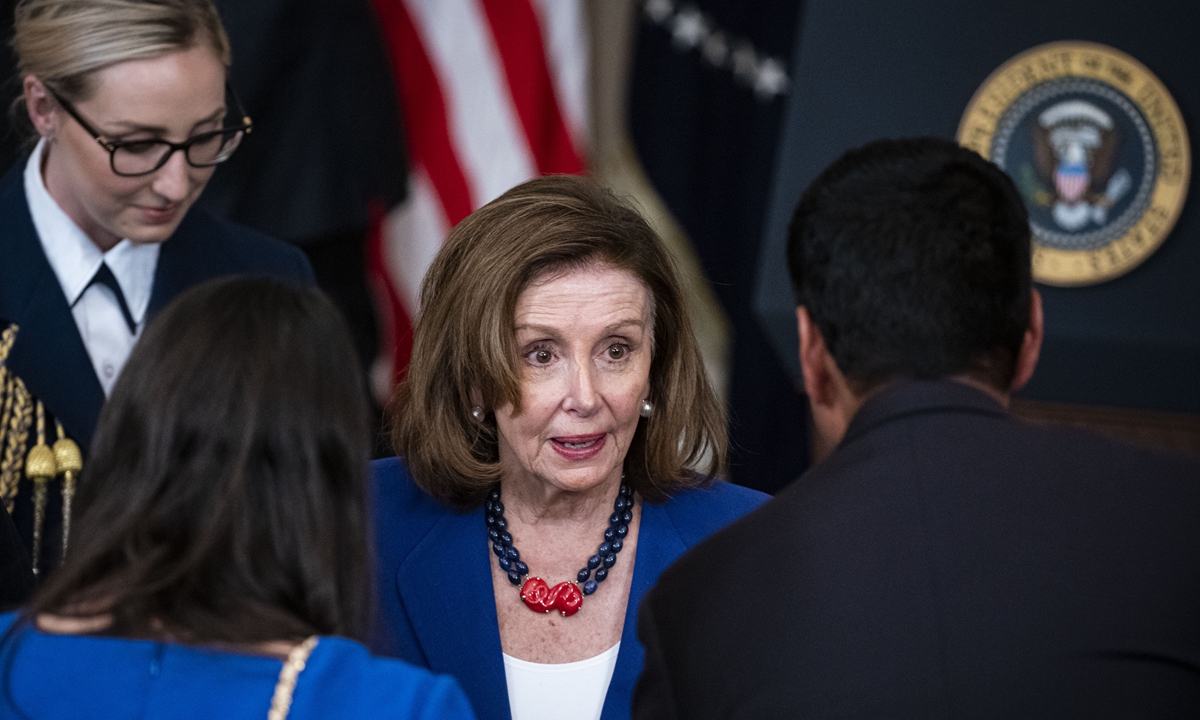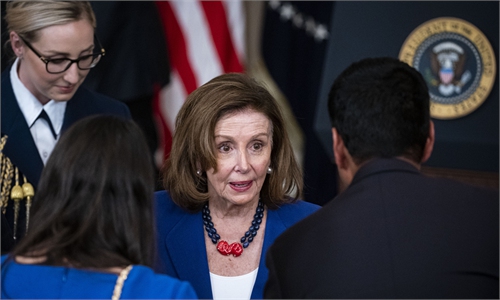White House’s concern over Pelosi’s visit hints at danger of miscalculation; time to ‘test Biden’s commitment’ made to China

US House Speaker Nancy Pelosi departs the White House in Washington DC following a signing event for a postal service reform act on April 6, 2022. Pelosi tested positive for COVID-19 on April 7 and postponed her Asia trip and reported visit to the island of Taiwan. Photo: VCG
After the US government received an unprecedentedly strong message from the Chinese side regarding US House Speaker Nancy Pelosi's planned visit to the island of Taiwan, the Biden administration appears to be increasingly concerned that the visit could lead to catastrophic consequences for China-US relations. Although the two top Democratic leaders share the same interest in using Taiwan question to serve their political goals ahead of the midterm elections, they are apparently not on the same page on how to play the Taiwan card.
Unlike US lawmakers who only take into account domestic political demands, the White House has to consider broader security concerns and the danger of miscalculation, as an escalating confrontation with the Chinese government over the Taiwan question will only hurt US own interests, experts said.
By using the excuse of separation of powers, the Biden administration reportedly hinted at the inability to control fellow Democrat Pelosi regarding trips she would undertake. Some Chinese experts said that if the Biden administration is determined to oppose it, the trip can't be made as such high-level visit needs the coordination with the administration in terms of security.
It is time to see if US President Joe Biden can fulfill his promises on US-China relations especially on the Taiwan question by dissuading this visit, which is widely seen as a severe provocation that could trigger an overwhelming response from the Chinese side, some experts warned, and the reaction of the Chinese side could become a game-changer for cross-Straits relations.
Growing concerns
The Biden administration is increasingly concerned that the planned trip by Pelosi to the island in August could spark a major crisis across the Taiwan Straits, and the White House and an array of national security officials have briefed Pelosi and her team about the risks of traveling now, the Washington Post reported on Saturday, citing administration officials.
Defense, military and intelligence officials have "tried to explain the risks associated with the timing of her proposed trip," and Mark Milley, chairman of the US Joint Chief of Staff, was among those officials, according to the US media report.
For now, administration officials are walking delicately - hoping to dissuade Pelosi without causing a public dust-up - but concerns about the potential fallout from her trip are widespread within the executive branch, the Washington Post said.
Also on Saturday, the Financial Times, citing several people familiar with the matter, said China has issued stark private warnings to the Biden administration about Pelosi's upcoming trip to Taiwan, triggering alarm bells among White House officials who oppose her visit.
Beijing has not been explicit about its potential response. Its military could try to block Pelosi from landing in the island or take other actions to impede her visit, such as using fighter jets to intercept her US military aircraft, the FT said.
"It shows that China's response is beyond the expectation of the US side, and Pelosi's plan has put Biden in a passive position given that the US military acknowledged the grave risks the trip could trigger," Lü Xiang, an expert on US studies at the Chinese Academy of Social Sciences, told the Global Times on Sunday.
It is believed the Chinese side will act on what it has said, given the sensitivity and severity of the matter, and its reaction to her trip could be the most severe in decades, marking a game-changer for the relations between the mainland and Taiwan, Lü said.
Biden said on Wednesday that the military thinks this planned trip is "not a good idea right now." US media outlets also pointed out that the White House clash with Pelosi over the matter has spilled into the open. The Washington Post said in an editorial that the trip "puts the Biden administration in a bind."
Lawmakers including Pelosi rarely consider national interests at a global level, they only care about their own political agenda, a Beijing-based expert on China-US relations who preferred not to be named told the Global Times on Sunday.
"Pelosi playing the Taiwan card aims to instigate military confrontation between China and the US, which is an incomprehensible move that not only hurts China-US relations but also the US itself, toward which the White House should have deeper understanding than Pelosi," he said.
Confusing signals
US National Security Adviser Jake Sullivan recently told the Aspen Security Forum that the US policy concerning the Taiwan question remains unchanged and Biden remains committed to a policy of "strategic ambiguity" regarding the matter, according to media reports.
Bloomberg also said in an article on Friday that Taiwan has been left "hurt" and confused by contradictory signals coming out of Washington over the possible visit.
Some Chinese experts said from what Biden has said over Pelosi's plan, they could tell the US President understands the severe consequences of the visit on which he appears to disagree, but the US top leader needs to play a more active role within the Democratic Party to prevent it from causing a catastrophic impact on US-China relations.
"Perhaps, the White House is not truly opposed to such a visit, but they don't want Pelosi to interrupt the Biden administration's agenda on the Taiwan question," Diao Daming, an associate professor at the Renmin University of China in Beijing, told the Global Times on Sunday.
Hopefully, the US government will fulfill its promises on China-US relations including not seeking conflicts with China and not supporting "Taiwan independence", but we need to fully prepare with the bottom-line thinking, Diao said.
Even though the Biden administration appears to understand the severity of the matter, the US official stressed that the administration cannot tell Pelosi what to do. In the Washington Post article, an unnamed official claimed that "we have to respect separation of powers."
"It's a bluff to use the excuse of separation of powers," Lü said, noting that a House Speaker would not be able to make a foreign visit without the coordination of the executive branch due to security issues.
"If the Biden administration firmly opposes it, the trip won't be made," he said.
If Pelosi visits Taiwan, no one will believe it is because Biden "cannot control her." People are more likely to believe that her visit is part of Washington's tactic of "good cop/bad cop," Hu Xijin, a commentator for the Global Times, recently said.
He also suggested that China establish a no-fly zone over Taiwan, or that the People's Liberation Army should send military aircraft to accompany Pelosi's plane when it enters the island and fly cross the island


